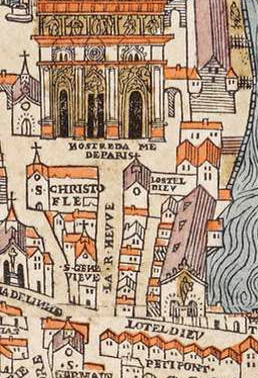Hôtel-Dieu, Paris
Hôtel-Dieu de Paris is one of the oldest hospitals in the city of Paris, France. It has a significant history that dates back to its founding by Saint Landry in 651, making it the oldest continuously operating hospital in the world. The hospital's primary mission has been to provide free care for the sick, with a focus on the poor and destitute. Over the centuries, Hôtel-Dieu has played a crucial role in the development of medicine and medical education, reflecting the evolution of healthcare practices and the history of Paris itself.
History[edit | edit source]
The origins of Hôtel-Dieu can be traced back to the 7th century, when it was established on the Île de la Cité, near the Notre-Dame Cathedral. Initially, it was a small institution that provided care for the sick and served as a refuge for the poor and travelers. The hospital expanded significantly over the centuries, especially during the Middle Ages, when it became an important center for medical practice and learning.
Throughout its history, Hôtel-Dieu has been at the forefront of medical innovation and public health. In the 16th century, it was among the first hospitals in Europe to establish a separate ward for patients with contagious diseases. During the French Revolution, it continued to serve the public despite the political and social upheavals of the time.
In the 19th century, the hospital underwent major renovations under the direction of Baron Georges-Eugène Haussmann, as part of his grand plan to modernize Paris. These renovations included the construction of new buildings and the introduction of modern medical facilities, which helped to improve patient care and hospital operations.
Facilities and Services[edit | edit source]
Today, Hôtel-Dieu de Paris is located on the Parvis Notre-Dame - Place Jean-Paul-II. It is part of the Assistance Publique – Hôpitaux de Paris (AP-HP), which is the public hospital system of Paris and its suburbs. The hospital offers a wide range of medical services, including emergency care, surgery, internal medicine, and ophthalmology. It is also a teaching hospital affiliated with the University of Paris, contributing to the education and training of future healthcare professionals.
Cultural and Historical Significance[edit | edit source]
Hôtel-Dieu holds a special place in the cultural and historical landscape of Paris. It is not only a medical institution but also a symbol of the city's commitment to caring for the vulnerable and sick. The hospital has been featured in various literary works and has been the subject of numerous historical studies.
Challenges and Future Directions[edit | edit source]
Like many historic institutions, Hôtel-Dieu faces challenges in adapting to the modern healthcare environment. There have been debates about the future of the hospital, including proposals to reduce its size or transform it into a specialized healthcare facility. Despite these challenges, Hôtel-Dieu remains an active and vital part of Paris's healthcare system, continuing its centuries-old mission of providing care to those in need.
See Also[edit | edit source]
Search WikiMD
Ad.Tired of being Overweight? Try W8MD's physician weight loss program.
Semaglutide (Ozempic / Wegovy and Tirzepatide (Mounjaro / Zepbound) available.
Advertise on WikiMD
|
WikiMD's Wellness Encyclopedia |
| Let Food Be Thy Medicine Medicine Thy Food - Hippocrates |
Translate this page: - East Asian
中文,
日本,
한국어,
South Asian
हिन्दी,
தமிழ்,
తెలుగు,
Urdu,
ಕನ್ನಡ,
Southeast Asian
Indonesian,
Vietnamese,
Thai,
မြန်မာဘာသာ,
বাংলা
European
español,
Deutsch,
français,
Greek,
português do Brasil,
polski,
română,
русский,
Nederlands,
norsk,
svenska,
suomi,
Italian
Middle Eastern & African
عربى,
Turkish,
Persian,
Hebrew,
Afrikaans,
isiZulu,
Kiswahili,
Other
Bulgarian,
Hungarian,
Czech,
Swedish,
മലയാളം,
मराठी,
ਪੰਜਾਬੀ,
ગુજરાતી,
Portuguese,
Ukrainian
Medical Disclaimer: WikiMD is not a substitute for professional medical advice. The information on WikiMD is provided as an information resource only, may be incorrect, outdated or misleading, and is not to be used or relied on for any diagnostic or treatment purposes. Please consult your health care provider before making any healthcare decisions or for guidance about a specific medical condition. WikiMD expressly disclaims responsibility, and shall have no liability, for any damages, loss, injury, or liability whatsoever suffered as a result of your reliance on the information contained in this site. By visiting this site you agree to the foregoing terms and conditions, which may from time to time be changed or supplemented by WikiMD. If you do not agree to the foregoing terms and conditions, you should not enter or use this site. See full disclaimer.
Credits:Most images are courtesy of Wikimedia commons, and templates Wikipedia, licensed under CC BY SA or similar.
Contributors: Prab R. Tumpati, MD






